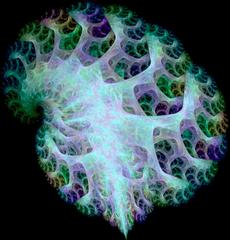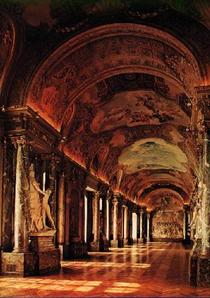| Tuesday, August 12, 2003 |
| Net Work |
 Now, if we all had sufficiently good information, that whole issue about what to do and how to make a living would just not be a problem. Now, if we all had sufficiently good information, that whole issue about what to do and how to make a living would just not be a problem.
Most of us have something very useful we can do, which is needed somewhere. For that matter, there will usually be somewhere where that which we most love to do is exactly what is needed. What makes our current economic system work very inefficiently is that we usually don't have good information about what is needed and where, and about who are the best people to deal with. And we don't have a good way of informing others about what we'd like to do, or what we can do. Oh, there's an overwhelming abundance of information around us, about products and services offered, and opportunities available. But it is not very good information. Most of it is bogus information. Advertising is mostly bogus information. It tries to make us desire and seek certain products, not based on that we really need them or that they're the best ones available, but based on making us want them, despite that we might not need them, or they aren't really the best. A free economic market is ideally perfectly fair, and is driven by information. If people consider a certain product or service worthless, the price will drop, and it will no longer be sensible to produce it. If people find a certain product or service very valuable and desirable, the price will go up, which will reward those who produce it, and inspire the production of more of it. Until there is too much of it, where the prices will then drop and things will adjust themselves again. It is a very sensible system of self-organization. It is unfortunately not completely how it works in real life. Some wrenches have been thrown into the free market, such as the existence of corporations, with corporate veils, and intellectual property right. We have a Monopoly game, essentially, where the biggest rewards go to those who most succeed in grabbing a monopoly in some area, in part by making their product look better than they really are, by paying less for producing them than what is fair, by hiding their corporate structure, by bribing governments to give them special treatment, and generally by hiding or embellishing the truth about how things really are. Oh, there's still a market there, so market mechanisms can still manage to adjust things, as some of the true information gets shared. The public might discover who consistenly produces bad products, or they might discover who really owns a company, or which public official is working for them, and they might disapprove. The system still tends to be more efficient than a centralized bureacracy. I suppose the communist system was based on the idea that if we centralize all the information, we can make the best possible decisions about what production power is needed where, and we can do things most efficiently. But the problem is that it ignored all the little pieces of information exchanged between individuals, and it ignored their individual choices, and their need to be motivated by personal accomplishment. And then a top-down hierarchy becomes very inefficient. No, what we really need is an open network of very well-informed people who make decisions based on what they know. If the information is mostly good, the result will be useful self-organization, despite that not all participants can be expected to make completely rational decisions. Imagine for a moment that we all had fully functional telepathy. I would know right away when you're lying to me, and I would know right away what you're actually doing, and how you are doing it, and with whom. There would be no point in you trying to tell me anything else, as I could just look in your mind and see the truth. Thus you wouldn't be able to sell me something that wasn't right for me, or which pretended to be something else than it really was. We'd need some kind of networked telepathy. I don't just need to know the truth about what you're about, I'd need to be able to quickly assess what is *out there*. What is offered and what is needed, in a wide sphere around me. Currently, if I need something, I might search on the net, look in a newspaper, write about it in my newslog, ask a few people. And quite often I'll find something that fits what I'm looking for. But it is in a very haphazard manner. Like, right now I have certain skills, certain experience, and certain desires, and I have a need for applying some of these in a way that my life is supported from it. Putting that out to a few hundred people who read this, and networking it a little bit on other sites - that does produce results. It is good to have friends. Quite often, what one is looking for might be found amongst the few dozen or few hundred friends one has. And that's certainly a good thing. But if we had a good enough information network, be it telepathic or computerized, there could very well be ways that I might access the information shared by thousands or millions of people, and it would be much more likely that I'll find what I'm looking for. I'm not talking about that I can do a search on keywords in a search engine. I can already do that, and that is great. But it gives me a very small portion of the whole picture. I'm right now in a city of close to a million people, and of course, amongst those, there will be some people who know a great place where some of my skills will fit in a very mutually advantageous place. But I only know a handful of people here. I'll know more. But most information is well hidden, so it takes a while. There's plenty to do here, and anywhere on the planet, and there are plenty of people who can do what needs to be done, and plenty of resources to do them with. The only thing in the way is our lack of ability to see all this clearly. We don't have enough good information, or it isn't structured to give a clear picture, or we're not sure we can trust it. Thus we operate based on small personal networks and questionable information from public sources. Where we really could operate at a whole different level if the real information was available. It is not an impossibly hard problem to solve this. Telepathy would be preferable, but it can also be done through well-structured computerized databases. Large numbers of people who share their knowledge and value judgements about many things. Better ways of expressing needs and offerings in a concise way. [ Organization | 2003-08-12 04:42 | 7 comments | PermaLink ] More > |
| Everyday |
 A few more tidbits from our life in Toulouse. We've lived here in the house for just 12 days, but it feels like home now. And, since we don't really have any money right now, we have to focus on the simpler things and actually be a bit more in touch with the local surroundings. I.e. we walk around or take the metro. I haven't not had a car for more than 20 years, so that in itself is sort of new. More work, but kind of refreshing. We get a lot of sun and exercise. A few more tidbits from our life in Toulouse. We've lived here in the house for just 12 days, but it feels like home now. And, since we don't really have any money right now, we have to focus on the simpler things and actually be a bit more in touch with the local surroundings. I.e. we walk around or take the metro. I haven't not had a car for more than 20 years, so that in itself is sort of new. More work, but kind of refreshing. We get a lot of sun and exercise.
The Metro is about 10 minutes of walking away. It is called Arenes and is by some quirky architect designed to look like an arena. There's essentially only one Metro line in Toulouse at this point, and they're working on one more. We can take it towards the center of town, stopping at various squares, or the other direction, towards the Mirail university and a shopping area called Basso Campo. The most likely reason for us to go there is that there's a big hypermarché there. That's a supermarket on steroids and the French have many of those on the outskirts of cities. Several times bigger than the biggest markets I've seen in the States, and selling a mixture of just about anything. Nothing fabulous about it other than the size, but it is a practical thing. Somewhat less practical without a car, though. Yesterday we dragged a folded up table home in the metro. We live in an area called La Cépière. I'm not sure what that means, but it seems to be the name of the horse race track which is very close to our house. Today I walked to the center of town to see how far it was. Not too bad. About 45 minutes or so. All of it is pretty pleasant, but the more interesting parts are crossing the Garonne river over Pont Neuf and the walking streets and areas around the Capitole Square. Today I walked into the Capitole (Town Hall) and looked at La Salle des Illustres. It is a gallery with richly decorated ceilings and huge paintings, mostly illustrating various historical aspects of Toulouse. We haven't particularly figured out how to blend in yet. I'm sure we look to the locals as obvious Americans. I'm sure that wearing white socks, a baseball cap, and carrying a water bottle in my hands and a map in my back pocket gives me away right away, before I even open my mouth to mangle the French language. But when anybody asks, I say we're Danish. And as to the house. Everybody else in the neighborhood seem to be hiding behind closed shutters with the lights out, being very quiet. Where our natural tendency is to open all windows and curtains and have lots of lights on. Even in L.A. our house looked like the christmas tree or fishbowl of the neighborhood. Here I'm not at all sure what they'll think about us. And we aren't exactly quiet people either. But so far the villagers haven't shown up at night with torches or anything. We don't have a TV yet, but maybe it would be useful after all to help with the language learning. Otherwise I have in mind that Marie-Therese and Zachery will attend an intensive French school from September 1st. Alliance Francaise probably. And Nadia will probably be in a local kindergarten when we find one. The language is really a big thing, and I'm looking forward to not being the only one who can answer the phone when it is in French. Getting to know some people here is a bit slower than I would like. Of course the language is an issue there too, and it will help when we can go out and sign up for various activities where you're likely to get to know people. French classes or fencing or whatever. One isn't very likely to make friends in the Metro here. [ Diary | 2003-08-12 17:24 | 4 comments | PermaLink ] More > |